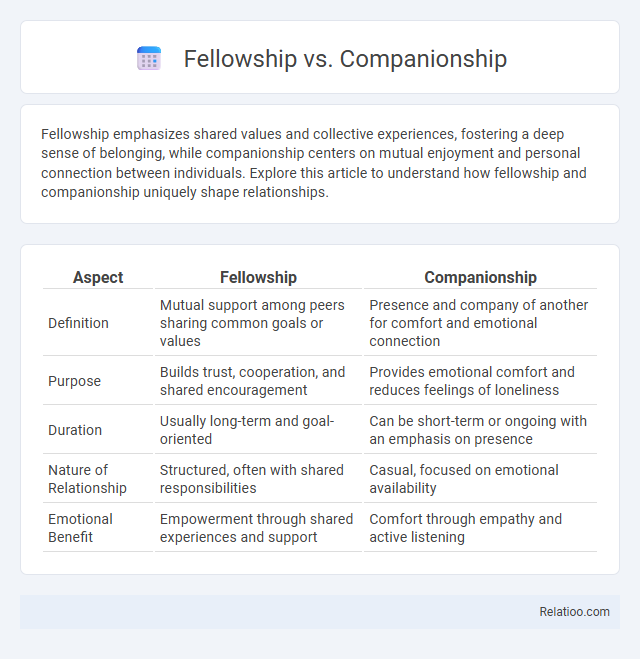Fellowship emphasizes shared values and collective experiences, fostering a deep sense of belonging, while companionship centers on mutual enjoyment and personal connection between individuals. Explore this article to understand how fellowship and companionship uniquely shape relationships.
Table of Comparison
| Aspect | Fellowship | Companionship |
|---|---|---|
| Definition | Mutual support among peers sharing common goals or values | Presence and company of another for comfort and emotional connection |
| Purpose | Builds trust, cooperation, and shared encouragement | Provides emotional comfort and reduces feelings of loneliness |
| Duration | Usually long-term and goal-oriented | Can be short-term or ongoing with an emphasis on presence |
| Nature of Relationship | Structured, often with shared responsibilities | Casual, focused on emotional availability |
| Emotional Benefit | Empowerment through shared experiences and support | Comfort through empathy and active listening |
Understanding Fellowship: Definition and Core Concepts
Fellowship represents a deep sense of community and shared purpose, fostering mutual support and collaboration among individuals. Understanding fellowship involves recognizing its core concepts such as trust, common goals, and collective growth, which differentiate it from mere companionship or casual association. Your engagement in fellowship enhances connection, belonging, and personal development within a meaningful social or professional group.
What is Companionship? Key Features Explained
Companionship refers to a close relationship or association between individuals characterized by mutual support, shared experiences, and emotional connection. Key features of companionship include trust, consistent communication, and a sense of belonging that fosters emotional well-being and social bonding. Unlike fellowship, which often involves a formal group or community with common goals, companionship emphasizes personal interaction and emotional intimacy.
Fellowship vs Companionship: Main Differences
Fellowship and Companionship both involve close relationships, but fellowship emphasizes shared goals, mutual support, and communal activities, often within a religious or academic context. Companionship focuses more on personal connection, emotional bonding, and spending time together without necessarily sharing a common purpose or group affiliation. The main difference lies in fellowship's collective engagement and purpose-driven nature versus companionship's individual-centered, emotional interaction.
The Emotional Impact of Fellowship
The emotional impact of fellowship profoundly influences your mental well-being by fostering a sense of belonging and mutual support. Unlike companionship, which often centers on casual interactions, fellowship builds deeper connections through shared goals and values, enhancing emotional resilience. This strong, purpose-driven bond provides comfort and motivation, making fellowship essential for long-term emotional health.
The Social Dynamics of Companionship
Companionship fosters close social bonds through shared experiences and emotional support, enhancing individual well-being and group cohesion. Fellowships often center around common professional or academic goals, promoting collaboration but with less emphasis on emotional intimacy. In contrast, social dynamics in companionship prioritize mutual understanding, trust, and consistent interpersonal interaction, creating a supportive network vital for mental health and social belonging.
Benefits of Fellowship in Personal Growth
Fellowship offers unique benefits in personal growth by fostering deep connections, emotional support, and shared experiences that enhance self-awareness and resilience. Unlike companionship, which emphasizes casual social interaction, fellowship involves committed engagement in a community or group with common values and goals. You gain a sense of belonging and motivation to improve, driving personal development through continuous mutual encouragement and accountability.
Companionship and Its Role in Daily Life
Companionship plays a crucial role in daily life by fostering emotional support, reducing feelings of loneliness, and enhancing overall well-being. Unlike fellowship, which often refers to shared interests in a group setting, companionship emphasizes one-on-one or close relational bonds that provide comfort and stability. Your mental and physical health can significantly benefit from meaningful companionship, making it a key element in sustaining balanced, fulfilling relationships.
Fellowship in Community and Group Settings
Fellowship in community and group settings emphasizes shared values, mutual support, and collective growth, fostering a strong sense of belonging and trust among members. Unlike companionship, which centers on casual or one-on-one relationships, fellowship involves active participation in communal activities and rites that reinforce group identity and purpose. This interconnected dynamic enhances social cohesion, promotes collaboration, and nurtures emotional and spiritual bonds within the community.
How to Cultivate Fellowship and Companionship
Fellowship and companionship both thrive on active engagement, shared values, and mutual support, yet fellowship often emphasizes a collective spiritual or purpose-driven connection, while companionship centers on personal bonds and emotional intimacy. To cultivate fellowship, create environments that encourage group participation, open communication, and collaborative activities, fostering a sense of belonging and shared mission. Building companionship requires consistent interpersonal interactions, empathy, and trust-building practices that deepen emotional connections and sustain long-term relationships.
Choosing Between Fellowship and Companionship for Lasting Relationships
Choosing between fellowship and companionship for lasting relationships depends on the depth and purpose of connection desired. Fellowship often involves shared values and collective goals, fostering a sense of belonging within a community, while companionship emphasizes personal bonds and emotional support through shared experiences. Prioritizing fellowship builds strong networks rooted in mutual commitment, whereas companionship nurtures intimate connections based on trust and empathy.

Infographic: Fellowship vs Companionship
 relatioo.com
relatioo.com